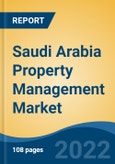Speak directly to the analyst to clarify any post sales queries you may have.
10% Free customizationThis report comes with 10% free customization, enabling you to add data that meets your specific business needs.
This economic transformation has led to a surge in demand for residential, commercial, and industrial real estate, creating opportunities for efficient property management services. The growing population - reaching 36.5 million in 2024 - and the influx of expatriates working on major developments like NEOM and Diriyah have further intensified the need for managed properties. Urbanization and the government's commitment to smart city projects are reinforcing the role of property management in maintaining and optimizing real estate assets, fueling sustained market growth across the Kingdom.
Key Market Drivers
Economic Growth and Urbanization
Economic diversification and urban expansion are key forces propelling the Saudi Arabia property management market. As the Kingdom invests in reducing its dependence on oil and developing new sectors, foreign investments and job opportunities are increasing, thereby intensifying demand for both residential and commercial real estate. Simultaneously, urbanization is accelerating, with over 84% of the population now living in cities such as Riyadh, Jeddah, and Dammam. This urban concentration drives the need for professional property management to oversee leasing, maintenance, and asset optimization. Government-backed initiatives to construct smart cities and modern infrastructure are further contributing to the growing reliance on property management services, especially in sectors such as hospitality, retail, and office real estate.Key Market Challenges
Regulatory Complexity and Compliance
Navigating the complex regulatory environment is a major challenge in the Saudi Arabia Property Management Market. In recent years, numerous legal reforms have been implemented to enhance transparency, tenant protection, and standardized real estate practices. However, the frequent changes in regulations related to leasing, taxation, and property rights require constant monitoring and adaptation. Property management companies must stay up to date with diverse municipal procedures and ensure full compliance with authorities such as RERA. The lack of a unified system for property documentation and varying regional requirements can lead to inefficiencies and confusion. Legal non-compliance may result in penalties and reputational damage, making regulatory adherence a critical concern for market players.Key Market Trends
Technology-Driven Property Management
The integration of digital technologies is transforming property management practices in Saudi Arabia. Companies are increasingly deploying advanced software platforms to streamline operations such as rent collection, maintenance scheduling, tenant screening, and financial reporting. These systems improve efficiency and data accuracy while reducing administrative burdens.Furthermore, the adoption of Internet of Things (IoT) devices is revolutionizing property monitoring - smart sensors, meters, and automation tools are enabling real-time oversight of energy usage, security, and facility performance. This tech-driven approach enhances operational cost management and elevates the tenant experience by offering features such as mobile-controlled living environments. As customer expectations evolve and digital transformation gains momentum, technology adoption is becoming essential for competitiveness in the property management sector.
Key Market Players
- Alandalus Property Company
- CBRE Inc. (CBRE Group)
- Colliers International Property Consultants, Inc.
- Land Sterling | KSA
- ARABMLS
- Savills plc group
- Cushman & Wakefield plc
- Lincoln Property Company Commercial LLC
Report Scope:
In this report, the Saudi Arabia Property Management Market has been segmented into the following categories, in addition to the industry trends which have also been detailed below:Saudi Arabia Property Management Market, By Component:
- Solution
- Service
Saudi Arabia Property Management Market, By Deployment:
- Cloud
- On-Premises
Saudi Arabia Property Management Market, By End User:
- Housing Associations
- Real Estate Agents
- Corporate Occupiers
- Property Investors
- Others
Saudi Arabia Property Management Market, By Application:
- Commercial
- Residential
- Industrial
Saudi Arabia Property Management Market, By Region:
- Riyadh
- Makkah
- Madinah
- Jeddah
- Tabuk
- Eastern Province
- Rest of Saudi Arabia
Competitive Landscape
Company Profiles: Detailed analysis of the major companies present in the Saudi Arabia Property Management Market.Available Customizations:
With the given market data, the publisher offers customizations according to a company's specific needs. The following customization options are available for the report.Company Information
- Detailed analysis and profiling of additional market players (up to five).
This product will be delivered within 1-3 business days.
Table of Contents
Companies Mentioned
- Alandalus Property Company
- CBRE Inc. (CBRE Group)
- Colliers International Property Consultants, Inc.
- Land Sterling | KSA
- ARABMLS
- Savills plc group
- Cushman & Wakefield plc
- Lincoln Property Company Commercial LLC
Table Information
| Report Attribute | Details |
|---|---|
| No. of Pages | 86 |
| Published | May 2025 |
| Forecast Period | 2024 - 2030 |
| Estimated Market Value ( USD | $ 12.58 Billion |
| Forecasted Market Value ( USD | $ 19.94 Billion |
| Compound Annual Growth Rate | 7.8% |
| Regions Covered | Saudi Arabia |
| No. of Companies Mentioned | 8 |









